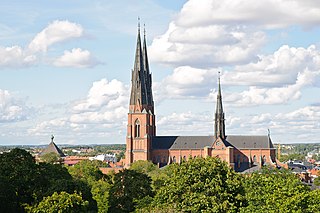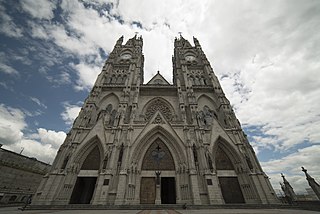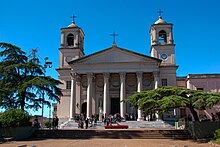
Christianity is the most widely professed religion in Argentina, with Roman Catholicism being its largest denomination. This historical background is very much due to the Spanish influence brought about through the newly conquered territories. However, affiliation with Protestant churches is increasing and immigration throughout the 20th century has brought other religions from various regions to Argentina.

The Catholic branch of Christianity is the dominant religion in Mexico, representing 78% of the total population as of 2020. In recent decades the share of Catholics has been declining, due to the growth of other Christian denominations – especially various Protestant churches, Jehovah's Witness and Mormonism – which now constitute 9.7% of the population, and non-Christian religions. Conversion to non-Catholic denominations has been considerably lower than in Central America, and central Mexico remains one of the most Catholic areas in the world.

Religion in Sweden has, over the years, become increasingly diverse. Christianity was the religion of virtually all of the Swedish population from the 12th to the early 20th century, but it has rapidly declined throughout the late 20th and early 21st century.

Religion in Colombia is dominated by various branches of Christianity and is an expression of the different influences in the Colombian culture including the Spanish, the Native Amerindian and the Afro-Colombian, among others.

Christianity is the dominant religion in El Salvador. The Catholic share of the population is on decline while Protestantism is experiencing rapid growth in recent decades. The Spanish Conquistador Pedro de Alvarado named part of the territory of modern day El Salvador after Jesus Christ - San Salvador. The territory's name, including the province of San Miguel, was later extended to the Provincia De Nuestro Señor Jesus Cristo, El Salvador Del Mundo, shortened to the Republic of El Salvador, or Salvador, during the post-Federal Republic period and subsequently settled on as El Salvador.
According to various polls, the majority of Kazakhstan's citizens, primarily ethnic Kazakhs, identify as Sunni Muslims. In 2020, Shia Muslims made up 0.55% of the population.

The Constitution provides for freedom of religion, and the government has generally respected this right in practice. Buddhism is the state religion.
Freedom of religion in South Korea is provided for in the South Korean constitution; the South Korean government has generally respected this right in practice.
In Qatar, the Constitution, as well as certain laws, provide for freedom of association, public assembly, and worship in accordance with the requirements of public order and morality. Notwithstanding this, the law prohibits proselytizing by non-Muslims and places some restrictions on public worship. Islam is the state religion.

Christianity is the most widely professed religion in Chile, with Catholicism being its largest denomination. The country is secular and the freedom of religion is established under its Constitution.

When it comes to religion, the Ecuadorian society is relatively homogeneous, with Christianity being the primary religion. Roman Catholicism is the main Christian denomination in the country. There are also minorities of other religions.
Christianity is the predominant religion in Paraguay, with Catholicism being its largest denomination. Before the arrival of Spanish missionaries, the people residing in the territory of modern day Paraguay practiced a variety of religions.

Christianity is the predominant religion in Eswatini, with Protestantism being its largest denomination.

Christianity is the largest religion in Nauru, with Nauru Congregational Church being the largest denomination, encompassing 35.71% of the population as of the 2011 census.

The predominant religion in Panama is Christianity, with Catholicism being its largest denomination. Before the arrival of Spanish missionaries, the various ethnic groups residing in the territory of modern day Panama practiced a multitude of faiths.

Religion in Suriname is characterized by a range of religious beliefs and practices due to its ethnic diversity. The government is vocally supportive of religious diversity and tolerance, and these attitudes are present in general society as well. According to the most recent census (2012), 48.4 percent of the population is Christian 22.3 percent is Hindu, 13.9 percent is Muslim, 1.8 percent follows Winti, and 0.8 percent is Kejawen. In addition 2.1 percent of the population follows other faiths, 7.5 percent are atheist or agnostic, and 3.2 percent did not answer the question about their religion. Later estimates suggest that Christians made up just over half the population in 2020.
Freedom of religion in Paraguay is provided for in the Constitution of Paraguay.

Religion in Slovakia is predominantly Christianity, adhered to by about 68.8% of the population in 2021, a decrease from 75.5% in 2011 and 83.8% in 2001.

The most common religion in Dominica is Christianity, with a majority of practitioners identifying as Roman Catholic. Various minority religious groups are also present on the island.
Mauritius is a religiously diverse nation, with Hinduism being the most widely professed faith. People of Indian descent (Indo-Mauritian) follow mostly Hinduism and Islam. The Franco-Mauritians, Creoles and Sino-Mauritians follow Christianity. A minority of Sino-Mauritians also follow Buddhism and other Chinese-related religions.

















